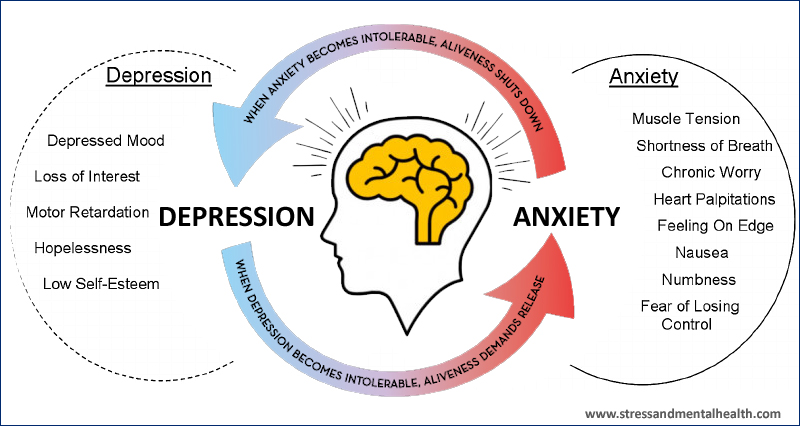Difference between Depression and Anxiety: Anxiety is intense, excessive, and persistent worry and fear about daily situations. It causes fast heart rate, rapid breathing, sweating, and feeling tired. Anxiety can be normal in stress full conditions such as taking tests. Anxiety is an indicator of disease when feelings become excessive and interfere in the daily routine work of life”.
Depression is a mental health disorder having continuous depressed moods or loss of interest in day-to-day activities causing impairment of daily routine life. Depression is a common and serious medical illness that negatively affects feelings or thinking and act.
Cause of anxiety
Big events or a buildup of stress full life conditions may trigger anxiety. For example death in the family, work stress, financial problems are responsible for anxiety. Chemical imbalance such as neurotransmitters serotonin, dopamine, norepinephrine, and gamma-aminobutyric acid are linked to mood and anxiety disorder
Cause of depression
The main cause of depression is physical, sexual abuse, lack of social support in old age, due to intake of certain medicines, death or loss of some dear person, in women hormonal changes, divorce, loss of job, serious illness, etc are responsible for depression. Depression is due to insufficient levels of serotonin in the brain.
Difference between Depression and Anxiety
Depression and Anxiety share a biological basis. Persistent states of anxiety involve changes in neurotransmitter function. Low serotonin levels play a role in both along with other brain chemicals such as dopamine and epinephrine.
On the other hand, biological underpinnings of these problems are similar anxiety and depression are experienced differently.
It can occur successively ( one in reaction to the other) or they can co-occur.
Depression and Anxiety have different psychological features. Their mental markers are different.
Mental Markers of Anxiety
People with anxiety may:
- Worry about the long-term future.
- Have uncontrollable, racing thoughts about something going wrong.
- Some people suffering from generalized anxiety disorder worry about a variety of topics, events, or activities.
- Some people suffering from social anxiety disorder are more apt to fear negative evaluation.
Mental Marker of Depression
People who are suffering from depression may:
- Patients always think negatively about themselves as well as others.
- People feel or believe that it is not worth trying or think differently.
- And think that every step of work is
- Always think negative that life is not worth living or that the individual is a burden on
In major depressive disorder (MDD) these types of thoughts are stable most of the day and remain present for more than a week.
Physical Signs of Anxiety
- Due to agitation difficulty in concentration.
- Dizziness.
- Gastroenterology problem, eg. Nausea, diarrhea.
- Increase heart beat, blood pressure.
- Sweating.
- Muscle tension.
- Shortness of breath.
Physical Signs of Depression
- Lack of concentration, focus on object or work
- Lack of energy.
- Loss or increase in appetite.
- Move slowly and also talk slowly.
- Irregular sleep. Either sleep more or sleep less.
- Loss of energy. Patient feels weakness through out day.
- Loss of interest in daily activities which were previously enjoyed.
- Purpose less physical activity, unable to sit still, writing on a paper without any purpose.
- Feeling guilty.
- Thought of death and suicide.
Symptoms and severity
It is natural that the patient feels a low mood or anxiety especially in the case of the loss of a loved one, due to physical illness, starting of new job or admission to a school, or in the matter of financial problems or implications, etc.
Treatment of Depression and Anxiety
First of all, determine that how much anxiety or depression affected your day-to-day work or daily life.
If the symptoms are mild or low, then it is better to divert your mind or thoughts towards some creative work and also to get some medication for anger or anxiety.
Psychotherapy
In addition to the above psychotherapies have an important role to overcome the symptoms of this disease. Several types of talk therapy have an important role. Cognitive-behavioral therapy (CBT), the treatment move toward anxiety and depression can vary slightly.
For anxiety, the aim is to minimize avoidant behavior and to help the patient disconfirm a feared consequence.
For depression, the aim is to help the patient to experience positive emotions.
Medication
A group of medicine known as selective serotonin reuptake inhibitors (SSRIs) is helpful for the treatment of above both the disease.
In addition to the above other tricyclic Antidepressants (TCAs), selective norepinephrine reuptake inhibitors (SNRIs), and anti-anxiety medication are required as per symptoms. These medicines are required to be taken under the supervision of a specialist doctor of the respective field is mandatory.
Frequently Asked Question about depression and anxiety
Q. What is the definition of anxiety and depression medication?
Ans. There are differences in the medication for anxiety and depression. Antidepressant medicines such as nortriptyline are for depression and other medicine such as benzodiazepines is used to treat anxiety.
Q. What are the Physical Signs of Anxiety?
Ans. The physical signs of anxiety are:
Due to agitation trouble in concentration.
Dizziness.
Gastroenterology problem, eg. Nausea, diarrhea.
Increase heartbeat, blood pressure.
Sweating.
Muscle tension.
Shortness of breath.
Q. What are the Physical Signs of Depression?
Ans. The physical sign of depression is.
Patient feels difficulty In concentration, focus on object or work.
The patient feels weakness.
Loss or increase in appetite.
Move slowly and also talk slowly.
Irregular sleep. Either sleep is more or sleepless.
Loss of energy. The patient feels weakness throughout the day.
